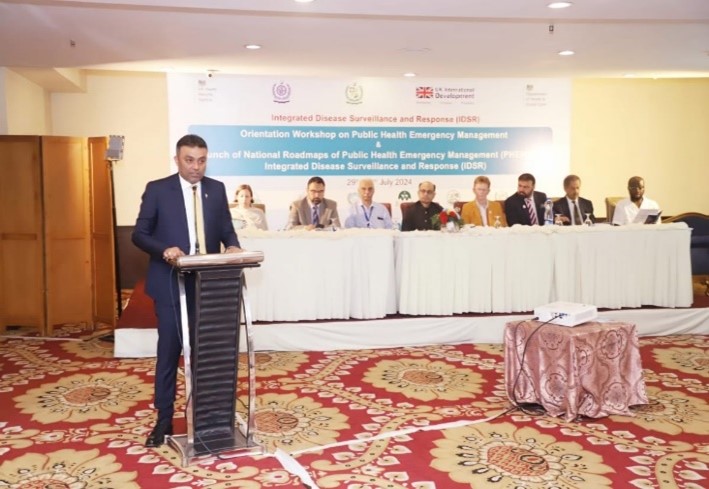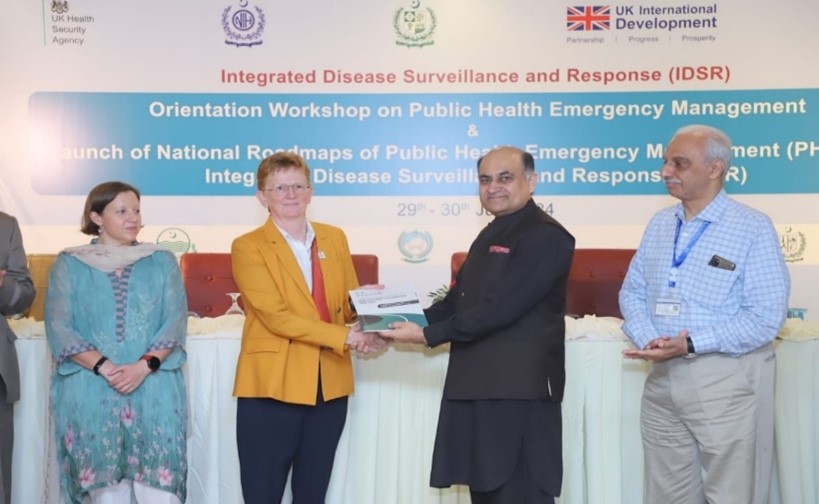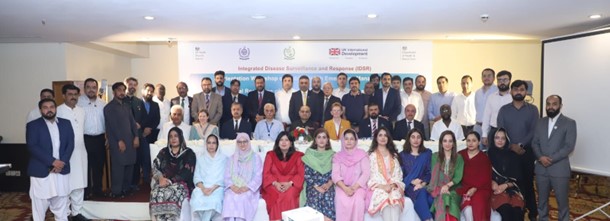
The United Kingdom Health Security Agency (UKHSA) International Health Regulations Strengthening Project (IHR-SP) provides technical support to partner countries for the development and strengthening of sustainable and resilient public health system in IHR implementation. Since 2016, UKHSA, IHR-SP in Pakistan has significantly contributed for the development and implementation of national Integrated Disease Surveillance and Response (IDSR) system. Initially, the focus of IHR-SP was to strengthen Pakistan’s capacity in four major areas under IHR; the coordination, surveillance, human resource, and national laboratory system, in partnership with ministry of National Health Services Regulation & Coordination (MoNHSR&C), National Public Health Institute/National Institute of Health (NIH), provincial health departments and other stakeholders. As a result of this operational model and expertise the National Institute of Health (NIH) requested the IHR-SP in-country team to support two further areas: public health emergency management (PHEM) and risk communication & community engagement linked with surveillance and response activities.

Picture 1: Launch of five-year road maps (IDSR and PHEM) and Inauguration of Public Health Emergency Management Training
The Joint External Evaluation (JEE) 2023 reported that Pakistan has limited capacity for most of the indicators under health emergency management (HEM), while for the technical area of surveillance, Pakistan has developed capacity for all three indicators. In response to the JEE recommendations to enhance Pakistan’s capacity in both areas, NIH in consultation with UKHSA and other partners developed a five-year roadmap for IDSR and Public Health Emergency Management (PHEM). This is aligned with Pakistan’s National Action Plan for Health Security (NAPHS). The roadmaps are strategic and provide guidance for operational planning. It will assist in rationalising activities to avoid duplication of resources.
NIH under the oversight of MoNHSR&C and in collaboration with development partners, provincial health departments and other stakeholders initiated the process to establish a structured and sustainable model of PHEM to deal with emergencies of international and national concern. After the notification of national and subnational Emergency Operation Centres (EOCs), NIH in collaboration with UKHSA IHR-SP jointly organised a two-day workshop on Public Health Emergency Management (PHEM) to formally launch the five-year roadmap for PHEM and IDSR.

Picture 2: Federal Special Secretary Health Presenting IDSR and PHEM road map to Head of IHR-SP UKHSA
The Federal Special Secretary MoNHSR&C inaugurated the launch of the roadmaps. At the end of inaugural session, the Federal Special Secretary Health endorsed the ownership of MoNHSR&C and distributed the copies of both roadmaps to all representatives from provincial/regional departments and development partners.
The event provided the opportunity to familiarise all participants and stakeholders on the five-year roadmaps for IDSR and PHEM. The workshop was co-chaired by the Federal Special Secretary MoNHSR&C and the Chief Executive Officer NIH alongside Head of IHR-SP UK, UKHSA Country Lead, senior officials from WHO and US Centers for Disease Control and Prevention (CDC).
Technical sessions on the five-year roadmap for PHEM were moderated by the IHR-SP Pakistan Epidemiology and Surveillance Lead alongside UKHSA IHR-SP Country Lead, IHR-SP Senior Leadership Team, US-CDC Pakistan Program Director and NIH. More than 50 representatives from national and provincial departments including health, livestock, environment, rescue and disaster management participated in the workshop. Representatives from the development partners WHO, JSI, US-CDC, EMPHNET and JHEPIEGO also participated and shared their insights.
The sessions covered main features of PHEM including the concept, objectives, key components/domains, structures and responsibilities, strategic plans and activities. Presentations also covered a broad range of EOC fundamentals including framework and governance structure, coordination, legislation, planning and implementation, concept of operations, incident management system, rapid response teams, risk communication & community engagement, level of escalation, activation & deactivation and information channels and dissemination.
Stakeholders and participants commended the UKHSA IHR-SP for their support and contribution to Pakistan over the last eight years and recognising the importance of PHEM in a strengthened public health system.

Picture 3: Group photo of all participants and stakeholders